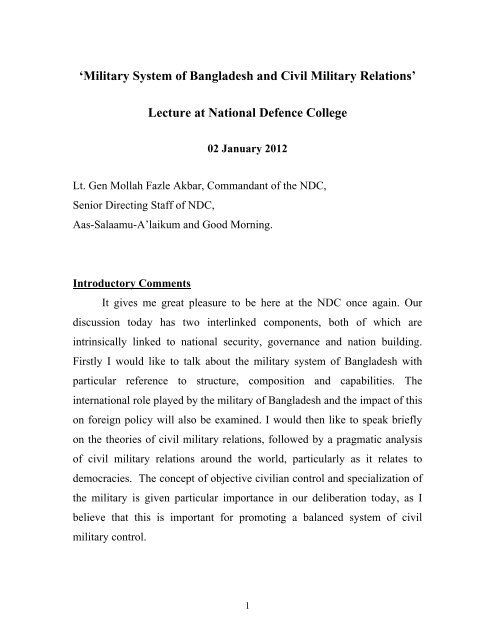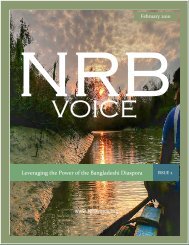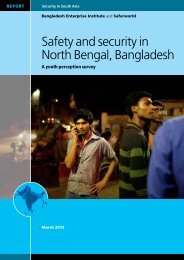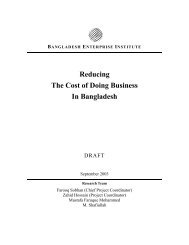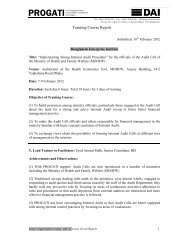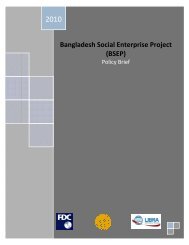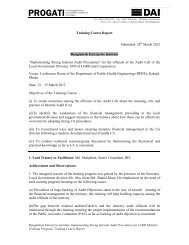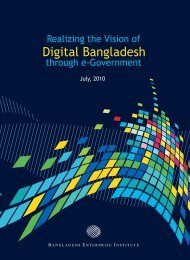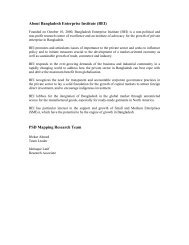'Military System of Bangladesh and Civil Military Relations' Lecture ...
'Military System of Bangladesh and Civil Military Relations' Lecture ...
'Military System of Bangladesh and Civil Military Relations' Lecture ...
Create successful ePaper yourself
Turn your PDF publications into a flip-book with our unique Google optimized e-Paper software.
‘<strong>Military</strong> <strong>System</strong> <strong>of</strong> <strong>Bangladesh</strong> <strong>and</strong> <strong>Civil</strong> <strong>Military</strong> Relations’<br />
<strong>Lecture</strong> at National Defence College<br />
02 January 2012<br />
Lt. Gen Mollah Fazle Akbar, Comm<strong>and</strong>ant <strong>of</strong> the NDC,<br />
Senior Directing Staff <strong>of</strong> NDC,<br />
Aas-Salaamu-A’laikum <strong>and</strong> Good Morning.<br />
Introductory Comments<br />
It gives me great pleasure to be here at the NDC once again. Our<br />
discussion today has two interlinked components, both <strong>of</strong> which are<br />
intrinsically linked to national security, governance <strong>and</strong> nation building.<br />
Firstly I would like to talk about the military system <strong>of</strong> <strong>Bangladesh</strong> with<br />
particular reference to structure, composition <strong>and</strong> capabilities. The<br />
international role played by the military <strong>of</strong> <strong>Bangladesh</strong> <strong>and</strong> the impact <strong>of</strong> this<br />
on foreign policy will also be examined. I would then like to speak briefly<br />
on the theories <strong>of</strong> civil military relations, followed by a pragmatic analysis<br />
<strong>of</strong> civil military relations around the world, particularly as it relates to<br />
democracies. The concept <strong>of</strong> objective civilian control <strong>and</strong> specialization <strong>of</strong><br />
the military is given particular importance in our deliberation today, as I<br />
believe that this is important for promoting a balanced system <strong>of</strong> civil<br />
military control.<br />
1
<strong>Military</strong> <strong>System</strong> <strong>of</strong> <strong>Bangladesh</strong><br />
The <strong>Bangladesh</strong> <strong>Military</strong> consist <strong>of</strong> three uniformed military services namely<br />
the Army, Navy <strong>and</strong> Air Force. The role <strong>of</strong> the <strong>Bangladesh</strong> <strong>Military</strong><br />
transcends beyond national security <strong>and</strong> defense to include law enforcement,<br />
disaster management, emergency services <strong>and</strong> international peacekeeping.<br />
Part 4 <strong>of</strong> the Constitution <strong>of</strong> <strong>Bangladesh</strong> lays out the principles <strong>of</strong><br />
authority <strong>and</strong> regulation as it relates to the defense forces. The constitution<br />
stipulates that ‘the supreme comm<strong>and</strong> <strong>of</strong> the defence services <strong>of</strong> <strong>Bangladesh</strong><br />
shall vest in the President <strong>and</strong> the exercise there<strong>of</strong> shall be regulated by law<br />
<strong>and</strong> such law shall, during the period in which there is a Non-Party Caretaker<br />
Government, be administered by the President.’ The Parliament is the<br />
regulatory body for the raising <strong>and</strong> maintaining <strong>of</strong> the defence services <strong>of</strong><br />
<strong>Bangladesh</strong> <strong>and</strong> <strong>of</strong> their reserves, the grant <strong>of</strong> commissions, the appointment<br />
<strong>of</strong> Chief <strong>of</strong> Staff <strong>of</strong> the defence services <strong>and</strong> the discipline <strong>and</strong> other matters<br />
relating to those services <strong>and</strong> reserves.<br />
The <strong>Bangladesh</strong> Army is the largest <strong>of</strong> the three services <strong>of</strong> the<br />
<strong>Bangladesh</strong> <strong>Military</strong>. The role <strong>of</strong> the <strong>Bangladesh</strong> Army is to defend<br />
<strong>Bangladesh</strong> against external aggressors <strong>and</strong> support national development<br />
during peacetime. At present there are almost 200,000 active personnel. 1 The<br />
Army also plays a significant role in the preservation <strong>of</strong> internal security.<br />
Army <strong>of</strong>ficers hold key posts in BGB, RAB, DGFI <strong>and</strong> various security<br />
organizations. Officers from the <strong>Bangladesh</strong> Army also hold civilian posts in<br />
1 <strong>Bangladesh</strong> Army Overview<br />
http://www.bdmilitary.com/index.php?option=com_content&view=article&id=68&Itemid=124<br />
2
educational institutions <strong>and</strong> other organizations intrinsic to the welfare <strong>of</strong> the<br />
nation.<br />
The <strong>Bangladesh</strong> Navy was established in April 7, 1972 to maintain<br />
sovereignty over the nation's territorial waters, to safeguard <strong>Bangladesh</strong>'s<br />
economic interest <strong>and</strong> exercise maritime control within the exclusive<br />
economic zone <strong>and</strong> the continental shelf, <strong>and</strong> to protect <strong>Bangladesh</strong>i<br />
shipping lines <strong>and</strong> its merchant fleet. At present the Navy is composed <strong>of</strong><br />
approximately 24,000 personnel <strong>and</strong> a mix <strong>of</strong> both aged <strong>and</strong> modern<br />
warships. In addition to its primary objective <strong>of</strong> upholding national maritime<br />
sovereignty, the <strong>Bangladesh</strong> Navy is also responsible for performing coast<br />
guard duties in support <strong>of</strong> the <strong>Bangladesh</strong> Coast Guard (BCG), search <strong>and</strong><br />
rescue operations, conducting cyclone warning for naval ships <strong>and</strong><br />
undertaking oceanographic survey. 2<br />
The <strong>Bangladesh</strong> Air Force consists <strong>of</strong> approximately 17,000<br />
personnel. The key roles <strong>of</strong> the <strong>Bangladesh</strong> Air Force include defending<br />
<strong>Bangladesh</strong>'s airspace <strong>and</strong> the <strong>Bangladesh</strong> military forces’ areas <strong>of</strong><br />
operation, carry out air transport operations, provide air intelligence,<br />
perform air search-<strong>and</strong>-rescue missions <strong>and</strong> to assist civil aviation authorities<br />
in comm<strong>and</strong>, control <strong>and</strong> services, as required.<br />
2 <strong>Bangladesh</strong> Navy Overview<br />
http://www.bdmilitary.com/index.php?option=com_content&view=article&id=90&Itemid=125<br />
3
Overall the <strong>Bangladesh</strong> <strong>Military</strong> not only preserves the sovereignty <strong>of</strong> the<br />
country but forms an integral component <strong>of</strong> nation building, provides<br />
rewarding careers to young men <strong>and</strong> women <strong>and</strong> serves as a dependable<br />
force in times <strong>of</strong> national crises. In addition to its contribution within the<br />
country, the <strong>Bangladesh</strong> military has achieved recognition <strong>and</strong> gratitude for<br />
its contribution to the U.N peacekeeping forces. According to the latest press<br />
release by the UN, at present 99,382 peacekeepers <strong>of</strong> 115 countries are<br />
deployed across the world. Of them, 10,589 or about 11 per cent <strong>of</strong> the<br />
world’s peacekeepers are from <strong>Bangladesh</strong>. Thus the <strong>Bangladesh</strong> <strong>Military</strong><br />
has heightened the image <strong>of</strong> the country abroad <strong>and</strong> displayed<br />
pr<strong>of</strong>essionalism <strong>and</strong> integrity in foreign countries under adverse<br />
circumstances. The achievements <strong>of</strong> the military have provided key Foreign<br />
Policy opportunities for <strong>Bangladesh</strong> to establish her image as a strong<br />
democratic nation overseeing a pr<strong>of</strong>essional military.<br />
Theories <strong>and</strong> Concepts <strong>of</strong> <strong>Civil</strong> <strong>Military</strong> Relations<br />
<strong>Civil</strong>-military relations generally refer to the interactions between<br />
armed forces as institutions <strong>and</strong> the society they belong to. In terms <strong>of</strong><br />
general definition, the democratic civil-military relations st<strong>and</strong> for the<br />
efficient management <strong>of</strong> security, based on the principles <strong>of</strong> democracy as<br />
well as <strong>of</strong> the governmental agencies associated with the above mentioned<br />
field. Developed states, with a few exceptions, have been able to maintain<br />
democratic civil-military relations, a system where civilian elites have the<br />
power <strong>of</strong> final decision making. However many developing countries have<br />
failed to maintain civilian supremacy for longer periods. In these states, the<br />
4
military constitutes the most obvious power base. It is a force to reckon with<br />
more at home than abroad <strong>and</strong> is used widely by civilian <strong>and</strong> military elites<br />
to strengthen their position. Scholars <strong>and</strong> academicians all over the world<br />
have provided many theories which suggest the different ways by which<br />
democratic civil-military relations have been maintained in developed states<br />
<strong>and</strong> can also be applied in third world states for bringing civilian supremacy.<br />
Classical liberal thinkers like Huntington, Finer & Janowitz <strong>and</strong> modern<br />
democratic thinkers like Feaver & Schiff are the most prominent ones.<br />
President Clinton pointed out in at a speech at Georgetown University<br />
in 1991, that countries with democratic governments are more likely to be<br />
reliable partners in trade <strong>and</strong> diplomacy <strong>and</strong> less likely to be a threat to<br />
peace than those with other forms <strong>of</strong> government. Samuel Huntington, the<br />
famous classical liberal thinker, also pointed out during the same time as<br />
Clinton gave his speech that, on the basis <strong>of</strong> past experience, an<br />
overwhelmingly democratic world is likely to be a world relatively free <strong>of</strong><br />
international violence. He argued that proper democratic practice for a<br />
country relies largely on the people <strong>and</strong> their political <strong>and</strong> military leaders.<br />
Huntington’s Liberal Approach: <strong>Civil</strong>ian Control through<br />
pr<strong>of</strong>essionalism<br />
Samuel Huntington attempted to find a balance in civil-military<br />
relations through his theory <strong>of</strong> civilian control through pr<strong>of</strong>essionalism. He<br />
provided his model <strong>of</strong> ‘Objective <strong>Civil</strong>ian Control’ in which <strong>Civil</strong>ian control<br />
is maintained through entrusting ‘pr<strong>of</strong>essionalism’ in military corps.<br />
<strong>Civil</strong>ians are entitled to dictate military security policy, but would leave the<br />
5
military elites free to determine what military operations are required to<br />
secure the policy objectives. The essence <strong>of</strong> objective civilian control is the<br />
recognition <strong>of</strong> autonomous military pr<strong>of</strong>essionalism <strong>and</strong> independent<br />
military sphere.<br />
Huntington argued that a high degree <strong>of</strong> civilian control could only be<br />
achieved in the modern state by a high degree <strong>of</strong> differentiation <strong>of</strong> military<br />
institutions from other social institutions <strong>and</strong> the creation <strong>of</strong> a thoroughly<br />
pr<strong>of</strong>essional <strong>of</strong>ficer corps. A pr<strong>of</strong>essional <strong>of</strong>ficer corps, he argued, was<br />
jealous <strong>of</strong> its own limited sphere <strong>of</strong> competence but recognized its<br />
incompetence in matters that lay outside the pr<strong>of</strong>essional military sphere <strong>and</strong><br />
hence was willing to accept its role as a subordinate instrument <strong>of</strong> the state.<br />
The less pr<strong>of</strong>essionalized the <strong>of</strong>ficer corps, on the other h<strong>and</strong>, the less<br />
differentiation there was between military <strong>and</strong> political roles <strong>and</strong> therefore<br />
the less justification for military obedience to political authority.<br />
Many scholars have disputed this classical liberal theory that<br />
pr<strong>of</strong>essionalism ensures the insulation <strong>of</strong> military from politics.<br />
Samuel E. Finer, another well-known political scientist, believed that<br />
pr<strong>of</strong>essionalism could, in fact, thrust the military into collision with civilian<br />
authorities, as military elites may see themselves as the servants <strong>of</strong> the state<br />
rather than <strong>of</strong> the government <strong>and</strong> also that armed forces may fall prey to<br />
‘military syndicalism,’ the idea that as specialists only they have the<br />
qualification to make decisions about defense. However, Huntington<br />
believed that pr<strong>of</strong>essionalism entailed the reorientation <strong>of</strong> the armed forces<br />
toward their rightful (external) missions, the elimination <strong>of</strong> overstaffing <strong>and</strong><br />
6
non-military responsibilities <strong>and</strong> the conferring on the armed forces the<br />
status <strong>and</strong> the respect they deserved.<br />
<strong>Civil</strong> <strong>Military</strong> Relations in various Nations<br />
The past three decades have seen a global trend <strong>of</strong> democratic<br />
transition going h<strong>and</strong> in h<strong>and</strong> with the decline <strong>of</strong> military regimes <strong>and</strong> open<br />
military intervention. In 1979, fourteen military regimes held power in sub-<br />
Saharan Africa, nine in Latin America, five in the Arab states <strong>and</strong> North<br />
Africa, three in Southeast Asia, two in South Asia, <strong>and</strong> one in East Asia.<br />
Since then, democracy replaced all <strong>of</strong> the military or “quasi-civilian”<br />
regimes in Latin America. In the Middle <strong>and</strong> Near East, military rule has<br />
almost universally transformed into civilian strongman rule except in recent<br />
months, where we have witnessed revolutions in several countries in the<br />
region, from Tunisia to Bahrain. In Asia, <strong>Bangladesh</strong>, Indonesia, South<br />
Korea, Thail<strong>and</strong> <strong>and</strong> Pakistan have moved from military domination to<br />
democracy or mixed patterns <strong>of</strong> civilian-military authority. To date,<br />
Myanmar is still the only country in Asia where the military openly rules by<br />
force.<br />
In spite <strong>of</strong> this development, asserting civilian control <strong>of</strong> the armed<br />
forces remains high on the political agenda in many emerging democracies.<br />
In most <strong>of</strong> the nations <strong>of</strong> South <strong>and</strong> Southeast Asia, the military used to be a<br />
key player, ruling through authoritarian regimes. Even today, after two<br />
decades <strong>of</strong> democratic development in East Asia, civilian control is still not<br />
an uncontested norm in the region. The only exception is Myanmar, where<br />
soldiers have controlled politics since 1962, though an opportunity for<br />
democratization did appear to open briefly in 1990, which ended in failure.<br />
7
These democratic changes have inspired an entirely new generation <strong>of</strong><br />
comparative analyses <strong>of</strong> democratic change in the region. In recent years,<br />
various comparative studies have been published which deal with<br />
institutions <strong>of</strong> democratic governance, their internal processes, <strong>and</strong> their<br />
impact on the consolidation <strong>of</strong> new democracies in the region. Additionally,<br />
there are several works which analyze relevant political decision-making<br />
institutions <strong>and</strong> organizations.<br />
Since the early 70s, democratization has witnessed the replacement <strong>of</strong><br />
authoritarian regimes by democratically elected governments at a<br />
phenomenal rate, including in Asia. In South Asia, for example, military<br />
rulers had to agree to share their power with democratically elected civilians<br />
in Pakistan in 1987-88, <strong>and</strong> in <strong>Bangladesh</strong> in 1990-1. Southeast Asia’s<br />
recent wave <strong>of</strong> democratization began with the demise <strong>of</strong> the personal<br />
dictatorship <strong>of</strong> Ferdin<strong>and</strong> Marcos in the Philippines in 1986. Thail<strong>and</strong> (1988,<br />
1992), Cambodia (1993), Indonesia (1999) <strong>and</strong> East Timor (2002) followed<br />
in successive order.<br />
Despite these regional democratic trends, Thail<strong>and</strong>, the Philippines,<br />
Indonesia, Pakistan <strong>and</strong> <strong>Bangladesh</strong> continue to be beset by unstable<br />
parliamentary institutions, weak rule <strong>of</strong> law, inchoate systems <strong>of</strong> political<br />
representation, chronic corruption, bureaucratic inefficiency, <strong>and</strong> a lack <strong>of</strong><br />
social justice. Meanwhile, the wave <strong>of</strong> democratization <strong>and</strong> people-power<br />
that swept through Southeast <strong>and</strong> South Asia in the 1980s <strong>and</strong> 1990s has had<br />
little effect on the military government <strong>of</strong> Myanmar. In addition,<br />
Cambodia’s nascent democracy eroded into a new kind <strong>of</strong> electoral<br />
8
authoritarianism under the leadership <strong>of</strong> Prime Minister Hun Sen in the late<br />
1990s. Furthermore, East Timor, Asia’s youngest nation <strong>and</strong> one <strong>of</strong> the<br />
United Nations’ prestigious showcases <strong>of</strong> post-conflict state building <strong>and</strong><br />
democratization, continues to st<strong>and</strong> in a condition <strong>of</strong> severe state fragility.<br />
Even though a major part <strong>of</strong> democratization efforts has involved<br />
removing militaries from the political arena <strong>and</strong> subordinating them under<br />
civilian control, such efforts have encountered a multiplicity <strong>of</strong> obstacles in<br />
most countries. Apart from Myanmar which today <strong>of</strong>fers a case <strong>of</strong> failed<br />
transition to democracy in the face <strong>of</strong> massive military control over political<br />
space, in the emerging democracies <strong>of</strong> Indonesia, the Philippines, Thail<strong>and</strong>,<br />
<strong>Bangladesh</strong>, <strong>and</strong> especially Pakistan, the military has shown itself more or<br />
less resilient in guarding its prerogatives in the post-authoritarian era. This<br />
seriously impedes the democratically elected authorities’ elective power to<br />
govern in these countries.<br />
<strong>Civil</strong>-<strong>Military</strong> Relations in <strong>Bangladesh</strong><br />
<strong>Civil</strong>-military relations in post colonial states are largely determined<br />
by the circumstances <strong>of</strong> their inception. 3 It is an undeniable fact that the<br />
1971 War <strong>of</strong> Liberation <strong>and</strong> the subsequent political <strong>and</strong> social ramifications<br />
pr<strong>of</strong>oundly influenced the trajectory <strong>of</strong> civil-military relations <strong>of</strong><br />
<strong>Bangladesh</strong>. 4 Generally, the War <strong>of</strong> Independence removed the colonial<br />
feature <strong>of</strong> physical <strong>and</strong> social distance between the civilian <strong>and</strong> military.<br />
However, subsequent political interventions, internal fractions <strong>and</strong> disparate<br />
ideologies have strained civil-military relations in <strong>Bangladesh</strong>. Despite this,<br />
taking into account the exogenous <strong>and</strong> endogenous factors effecting civil-<br />
3 Wolf (2010) pg 201 http://www.fesasia.org/media/publication/2010_Demcracy%20under%20Stress_ISIS.pdf<br />
4 Khan (2009) http://www.thedailystar.net/newDesign/news-details.php?nid=114617<br />
9
military relations, the military was <strong>and</strong> will continue to be, an important<br />
denominator in politics as well as nation building. Past military regimes<br />
should not undermine the fact that <strong>Bangladesh</strong>, as a nation, is inherently<br />
democratic. The democratic aspirations <strong>of</strong> people, the activities <strong>of</strong> NGOs,<br />
neighboring states, donor countries <strong>and</strong> contemporary economic <strong>and</strong> social<br />
factors all determine the viability <strong>of</strong> civil-military relations in <strong>Bangladesh</strong>. 5<br />
Non-intervention <strong>of</strong> politics in the military, the organization <strong>of</strong> dialogues<br />
between civil <strong>and</strong> military stakeholders <strong>and</strong> autonomy <strong>of</strong> the military in<br />
undertaking its basic roles concerning national interest, as well as the<br />
subjugation <strong>of</strong> military to lawful political control would all contribute in<br />
enhancing a harmonious <strong>and</strong> beneficial civil-military relationship.<br />
<strong>Civil</strong>-<strong>Military</strong> Relations in Pakistan<br />
In our region, one can cite Pakistan as the classic example <strong>of</strong> a<br />
praetorian state, in which the Army perceived itself as the sole guardian <strong>of</strong><br />
the nation’s sovereignty <strong>and</strong> moral integrity, as well as, the chief initiator <strong>of</strong><br />
the national agenda <strong>and</strong> the main arbiter <strong>of</strong> conflict between social <strong>and</strong><br />
political forces. 6 The ubiquity <strong>of</strong> the military’s role in all aspects <strong>of</strong> national<br />
governance has meant that Pakistan, until today has never experienced a<br />
period <strong>of</strong> civilian supremacy. Decades <strong>of</strong> military rule has accentuated the<br />
military’s dominance in foreign policy, national defense <strong>and</strong> internal<br />
security. Recently Pakistan is perceived to have moved to a higher degree <strong>of</strong><br />
civilian control after alternating periods <strong>of</strong> direct <strong>and</strong> non-direct military<br />
rule. The traditional alliance between the military <strong>and</strong> the Ministries <strong>of</strong><br />
5 Wolf (2010) pg 201 http://www.fesasia.org/media/publication/2010_Demcracy%20under%20Stress_ISIS.pdf<br />
6 Kane 2010 pg- 171 http://www.fesasia.org/media/publication/2010_Demcracy%20under%20Stress_ISIS.pdf<br />
10
Defense <strong>and</strong> Foreign Affairs are deteriorating due to efficiency issues <strong>and</strong><br />
differences <strong>of</strong> interest. It is undeniable that the democratic system in<br />
Pakistan needs to be further strengthened <strong>and</strong> the role <strong>of</strong> civil society in<br />
governance needs to be enhanced in order to bring balance <strong>and</strong> cohesion to<br />
civil-military relations in Pakistan.<br />
What Society Expects <strong>of</strong> the <strong>Military</strong><br />
In this discussion we are having, it would be pertinent to speak a bit<br />
about society’s expectation from the military. What do civilian authorities<br />
<strong>and</strong> the people more generally expect <strong>of</strong> the military as part <strong>of</strong> this compact?<br />
Operational Competence<br />
Above all else, they expect operational competence--the ability <strong>of</strong> the<br />
military to fulfill its mission, to get the job done, to accomplish all tasks<br />
assigned, even those that are only implied.<br />
Sound Advice<br />
A second thing civilians expect <strong>of</strong> the military is sound advice --<br />
rendering the best possible pr<strong>of</strong>essional judgment to the elected <strong>and</strong><br />
appointed civilian authorities who are supposed to be accountable for the<br />
country's security.<br />
Political Neutrality<br />
Third, civilians also expect the military to be politically neutral--to remain<br />
above the unseemly expediency, favoritism, <strong>and</strong> self-interested deal making<br />
<strong>of</strong> low, partisan politics.<br />
11
Social Responsibility<br />
Finally, civilians expect the military to be socially responsible -- to be an<br />
institution that not only gets the job done operationally, but that does so in a<br />
manner that contributes to, or at least doesn't undermine, the values <strong>and</strong><br />
institutions <strong>of</strong> civil society. This imperative assumes heightened, even<br />
overriding, importance when the military is employed in response to<br />
domestic emergencies such as terrorism or drug trafficking.<br />
In the context <strong>of</strong> unconventional, asymmetric warfare <strong>and</strong> the<br />
contemporary auxiliary <strong>of</strong> nation-building, civil-military relations must be<br />
reassessed <strong>and</strong> contentious efforts must be undertaken to close the gap<br />
between civil <strong>and</strong> military constituents <strong>of</strong> statecraft. A cohesive civilmilitary<br />
relationship is not only a prerequisite for conducting international<br />
security initiatives such as humanitarian interventions but also for addressing<br />
national security concerns <strong>of</strong> terrorism, insurgency <strong>and</strong> politically motivated<br />
violence. In order to ensure the safety <strong>and</strong> security <strong>of</strong> a nation, stakeholders<br />
from military <strong>and</strong> civil society must engage in robust discussions aimed at<br />
minimizing communication <strong>and</strong> operational gaps <strong>and</strong> promulgate concerns<br />
<strong>and</strong> recommendations. It was with this conviction that The <strong>Bangladesh</strong><br />
Enterprise Institute, in partnership with the Defense Institute Reform<br />
Initiative <strong>of</strong> the U.S Department <strong>of</strong> Defense undertook a year-long exercise<br />
titled ‘Towards Developing a Counter-Terrorism Strategy for <strong>Bangladesh</strong>’,<br />
the essential goal <strong>of</strong> which was to enhance the effectiveness <strong>of</strong> civil-military<br />
relations. The four workshops spanning multiple days, facilitated a cohesive,<br />
interactive platform for civilian <strong>and</strong> military stakeholders to engage in<br />
12
collaborative, interactive deliberations featured by presentations, break-out<br />
groups <strong>and</strong> discussion sessions. This collaborative scheme was a resounding<br />
success in bringing together academicians, representatives <strong>of</strong> government<br />
ministries, law enforcement, <strong>and</strong> national defense <strong>and</strong> incorporating their<br />
recommendations in the drafting <strong>of</strong> a national counter-terrorism strategy for<br />
<strong>Bangladesh</strong>, which will be submitted to the government. Thus a civilmilitary<br />
relation is an essential determinant <strong>of</strong> a country’s security <strong>and</strong><br />
stability at home <strong>and</strong> the effectiveness <strong>of</strong> its military operations abroad. In a<br />
dynamic, interlinked security environment comprising <strong>of</strong> traditional <strong>and</strong><br />
non-traditional security constituents, asymmetric warfare <strong>and</strong> the<br />
contemporary auxiliaries <strong>of</strong> terrorism <strong>and</strong> nation-building, cohesive civilmilitary<br />
relations are essential in ensuring peace <strong>and</strong> stability. Further<br />
initiatives must be undertaken to enhance civil-military collaborations to<br />
prepare <strong>Bangladesh</strong> for the complex security challenges within the<br />
interconnected geopolitical matrix <strong>of</strong> the 21 st century.<br />
I would like to thank the National Defense College for organizing this<br />
introspective session <strong>and</strong> also express my gratitude to the members <strong>of</strong> the<br />
audience for your kind attention.<br />
13


